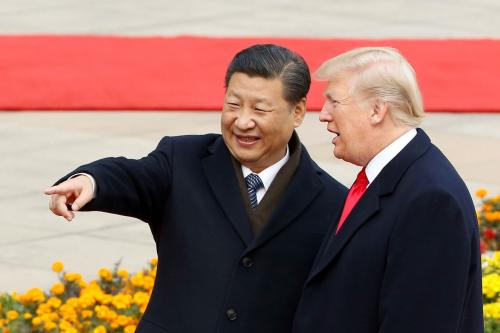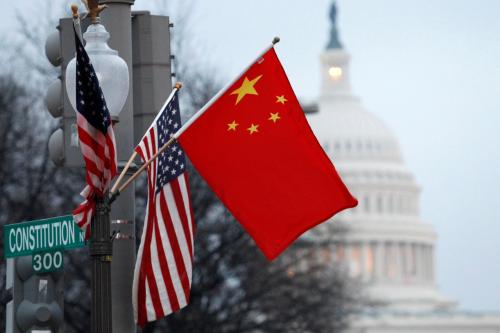The United States has lost a friend, but a friend who became a problem. A big problem. The story of how Suharto moved from being a great friend to a great embarrassment holds important lessons.
Political instability
Suharto did the United States an enormous favor back in 1965 when he steered Indonesia away from becoming the third most populous country in the Communist bloc, after China and Russia.
The opportunity to perform this feat grew out of the failure of the democratic political system partly adopted by Indonesians and partly imposed by the West after the Indonesians waged a successful struggle for independence from their Dutch colonial rulers.
As the constitutional democracy established in 1950 became increasingly dysfunctional year by year, Indonesia’s first president — Soekarno — moved closer and closer to an increasingly confident Communist Party of Indonesia (PKI).
Suharto steps in
A coup attempt, possibly inspired by the PKI, was bungled, and Major General Suharto stepped in to restore order. A nation-wide bloodbath ensued — and it took more than two years for Suharto to consolidate power in his hands.
First lesson: In some countries, electoral democracy can be a recipe for political chaos.
Shortly after taking control of the government, Suharto did the Indonesian people an enormous favor by delegating responsibility for formulating and implementing economic policies to a group of U.S.-trained “technocrats.”
Yielding power to technocrats
This strategic choice was surprising and courageous. Nothing in Suharto’s background as a military officer from a modest family explains why he made this choice.
It was courageous because it meant yielding power to three key institutions — the central bank for monetary policy, the finance ministry for tax policy and the planning ministry for expenditure policy.
The benefits of Suharto’s wise choice on the economic front were soon apparent. The Indonesian economy moved onto a high-growth path and stayed there for more than 20 years. Per capita income increased rapidly, education and health indicators improved sharply — and the bulk of the population shared in the well-being.
Steering progress
The political stability achieved through Suharto’s skillful manipulation of a wide range of contending forces (separatists, religious movements, students, the military, etc.) was instrumental in making Indonesia one of Southeast Asia’s “tigers” — alongside Malaysia, the Philippines, Singapore and Thailand.
Second lesson: In some countries, the best recipe for economic prosperity can be an authoritarian regime, at least for a period of time.
Prosperity at a cost
However, the political stability and economic progress of the 1970s and 1980s came at a cost that became glaringly evident in the 1990s. A small group of cronies who had done business with Suharto before he became president were granted business monopolies and preferential access to bank credit.
They became immensely wealthy and began partnering with Suharto’s children when they reached adulthood. The children, in short order, became even more rapacious than the cronies.
At the same time, as the general population became more prosperous and better educated, it began to resent the privileges of Suharto’s inner circle and to aspire to a voice in the nation’s governance.
Downfall
At some point in the 1990s, perhaps in 1993 when Suharto orchestrated his re-election to a sixth five-year term as president, his popular support fell below a critical threshold — while the ability of the vested interests to block critical reforms rose above a critical threshold.
The financial crisis that erupted in late 1997 and ultimately forced Suharto to resign in 1998 can be seen as a consequence of these two trends.
Third lesson: Authoritarian regimes that fail to devise effective procedures for routine leadership succession are likely to have messy endings.
The next generation
Since 1998, four presidents have shepherded Indonesia’s remarkable transition to democratic rule. None has yet served out a full term. Susilo Bambang Yudhyono (SBY), the current president, is as enlightened a leader as one can imagine coming out of the Indonesian military establishment with its sad history of self-serving business activities and heavy-handed suppression of dissent.
He has not been able to re-create the feeling of economic progress that Suharto achieved, however, because of crushing institutional weaknesses in the legislature, in the bureaucracy and in the judiciary.
The limits of democracy
SBY knows what needs to be done but cannot do it because he does not have the power to rule that Suharto had. In effect, right now, it can be said that Indonesia is suffering from an excess of democracy.
Indonesians will draw their own lessons from Suharto’s legacy. For Americans in the post-Cold War, post-9/11 world, Suharto’s passing is an object lesson in the limits of a U.S.-style democracy.
The Brookings Institution is committed to quality, independence, and impact.
We are supported by a diverse array of funders. In line with our values and policies, each Brookings publication represents the sole views of its author(s).


Commentary
Op-edIndonesia’s Democracy Lessons
January 31, 2008